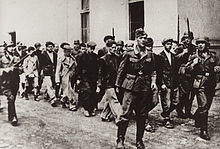Franz Böhme (officer)
Franz Böhme (born April 15, 1885 in Zeltweg , † May 29, 1947 in Nuremberg ) was an Austrian officer and general of the mountain troops in the German Wehrmacht . During World War II , as Plenipotentiary Commanding General in Serbia, he was responsible for massacres of civilians.
Life
Franz Böhme lost his father at the age of 17 in 1902 and his mother two years later. After attending school, on August 14, 1904, he joined the kuk 95 infantry regiment as an ensign . He completed an officer career in the Austro-Hungarian Army (1905 lieutenant , 1914 first lieutenant , 1915 captain ). During the First World War , Böhme was deployed in Galicia from 1914 to 1916, in 1917 in Volhynia , Courland and Dünaburg , and finally in 1917/18 on the Isonzo Front. Among other things, he was awarded the Karl Troop Cross and the German Iron Cross I and II Class.
After the war Böhme was taken over into the Austrian Armed Forces, in which he mainly served in general staff positions. From 1935 to 1938, as major general, he was head of the intelligence service of the Austrian Armed Forces . In the Berchtesgaden Agreement of February 12, 1938, Böhme was designated as the successor to the Chief of the General Staff Field Marshal Lieutenant Alfred Jansa , who had advocated repelling a German attack on Austria. The change took place on February 17th.
After Austria was annexed to the Third Reich, Böhme was temporarily without a command before he was transferred to Brandenburg an der Havel in November 1938 as site elder. From July 1939 to June 1940 he was in command of the 32nd Infantry Division with which he took part in the attack on Poland and the French campaign of the German Wehrmacht. Here he received the Knight's Cross .
The high honor was followed on August 1, 1940 by promotion to general of the infantry . In the autumn of 1940 Böhme became the commanding general of the XVIII. Mountain Corps appointed, which was deployed in the Balkan campaign in the spring of 1941 . From September 16 to December 2, 1941 he was Plenipotentiary Commanding General in Serbia . Adolf Hitler commissioned Böhme to “restore order in the whole area with the sharpest means”. Böhme ordered that "all communists , male residents suspected as such, all Jews , a certain number of nationalist and democratically-minded residents should be arrested as hostages ". In the event of Wehrmacht casualties, they were to be shot at a ratio of 1: 100 for each person killed and 1:50 for each wounded person by the Wehrmacht firing squads. Based on this order, the Wehrmacht shot Serbs, Serbian Jews and Gypsies in autumn 1941 .
In the cities of Kraljevo and Kragujevac , units of the 717th Infantry Division took revenge on the civilian population after fierce artillery fighting with partisans and Chetniks and shot more than 4,000 residents within a few days ( Kraljevo and Kragujevac massacres ). After Boehme's stay as Plenipotentiary Commanding General in Serbia for only two months, the following balance emerged in December 1941: The 160 fallen and 278 wounded members of the Wehrmacht were officially compared to 3562 partisans killed in action and between 20,000 and 30,000 killed civilians.
From May 1942 to December 1943 Böhme commanded his corps on the Arctic Ocean front before he was transferred to Salzburg as military district commander . On March 23, 1944, his rank was changed to General of the Mountain Troops and in June 1944 he was given the command of the 2nd Panzer Army in Yugoslavia, but after a few weeks he was seriously injured in a plane crash. From January 1945 until the end of the war he was Wehrmacht commander in chief in Norway and commander in chief of the 20th Mountain Army .
In May 1945 Böhme was taken prisoner by the British in Norway . In 1946 he was in the 198 prisoner of war camp near Bridgend in South Wales and was indicted on May 13, 1947 in the Nuremberg hostage trial. Before the hearing began, he committed suicide on May 29, 1947. He is buried in the St. Leonhard Cemetery in Graz .
literature
- Walter Manoschek: Serbia is free of Jews. Military occupation policy and the extermination of Jews in Serbia 1941/42. 2nd Edition. Series of publications by the Military History Research Office . Munich 1995.
Individual evidence
- ^ Walter Manoschek , Hans Safrian : Austrians in the Wehrmacht. In: E. Talos, E. Hanisch, W. Neugebauer (eds.): NS rule in Austria 1938–1945. Vienna 1988, ISBN 3-900351-84-8 , p. 341
- ↑ Martin Zöller; Kazimirz Leszczyński Ed .: Case 7 - The hostage murder trial ruled by the United States Military Tribunal V. VEB Verlag der Wissenschaften, Berlin 1965, p. 80.
Web links
| personal data | |
|---|---|
| SURNAME | Böhme, Franz |
| BRIEF DESCRIPTION | Austrian officer and general of the mountain troops of the German Wehrmacht |
| DATE OF BIRTH | April 15, 1885 |
| PLACE OF BIRTH | Zeltweg |
| DATE OF DEATH | May 29, 1947 |
| Place of death | Nuremberg |

